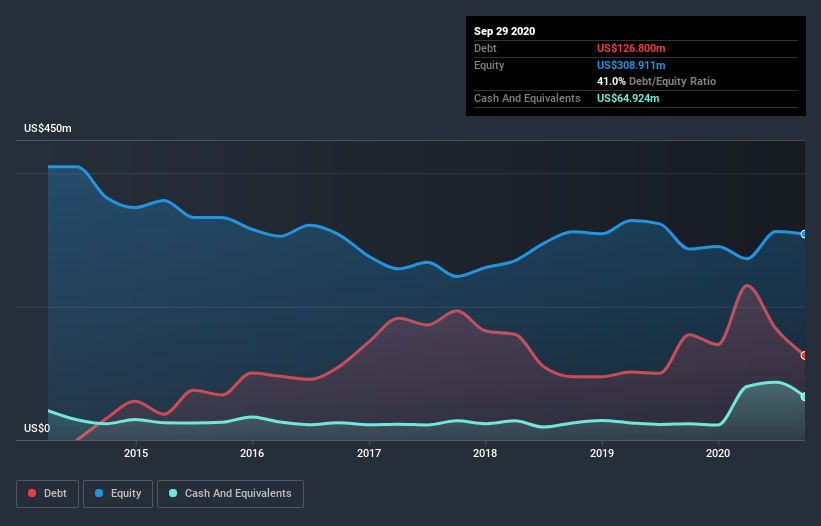- United States
- /
- Hospitality
- /
- NasdaqGS:BJRI
Does BJ's Restaurants (NASDAQ:BJRI) Have A Healthy Balance Sheet?

The external fund manager backed by Berkshire Hathaway's Charlie Munger, Li Lu, makes no bones about it when he says 'The biggest investment risk is not the volatility of prices, but whether you will suffer a permanent loss of capital.' So it seems the smart money knows that debt - which is usually involved in bankruptcies - is a very important factor, when you assess how risky a company is. Importantly, BJ's Restaurants, Inc. (NASDAQ:BJRI) does carry debt. But is this debt a concern to shareholders?
When Is Debt Dangerous?
Debt assists a business until the business has trouble paying it off, either with new capital or with free cash flow. In the worst case scenario, a company can go bankrupt if it cannot pay its creditors. However, a more usual (but still expensive) situation is where a company must dilute shareholders at a cheap share price simply to get debt under control. Having said that, the most common situation is where a company manages its debt reasonably well - and to its own advantage. When we think about a company's use of debt, we first look at cash and debt together.
View our latest analysis for BJ's Restaurants
What Is BJ's Restaurants's Debt?
As you can see below, BJ's Restaurants had US$126.8m of debt at September 2020, down from US$158.0m a year prior. However, it also had US$64.9m in cash, and so its net debt is US$61.9m.

How Strong Is BJ's Restaurants' Balance Sheet?
Zooming in on the latest balance sheet data, we can see that BJ's Restaurants had liabilities of US$163.5m due within 12 months and liabilities of US$594.3m due beyond that. Offsetting these obligations, it had cash of US$64.9m as well as receivables valued at US$14.0m due within 12 months. So it has liabilities totalling US$679.0m more than its cash and near-term receivables, combined.
This is a mountain of leverage relative to its market capitalization of US$1.06b. Should its lenders demand that it shore up the balance sheet, shareholders would likely face severe dilution. The balance sheet is clearly the area to focus on when you are analysing debt. But it is future earnings, more than anything, that will determine BJ's Restaurants's ability to maintain a healthy balance sheet going forward. So if you're focused on the future you can check out this free report showing analyst profit forecasts.
Over 12 months, BJ's Restaurants made a loss at the EBIT level, and saw its revenue drop to US$873m, which is a fall of 24%. To be frank that doesn't bode well.
Caveat Emptor
Not only did BJ's Restaurants's revenue slip over the last twelve months, but it also produced negative earnings before interest and tax (EBIT). Indeed, it lost US$42m at the EBIT level. Considering that alongside the liabilities mentioned above does not give us much confidence that company should be using so much debt. So we think its balance sheet is a little strained, though not beyond repair. For example, we would not want to see a repeat of last year's loss of US$25m. So we do think this stock is quite risky. The balance sheet is clearly the area to focus on when you are analysing debt. But ultimately, every company can contain risks that exist outside of the balance sheet. Case in point: We've spotted 4 warning signs for BJ's Restaurants you should be aware of.
Of course, if you're the type of investor who prefers buying stocks without the burden of debt, then don't hesitate to discover our exclusive list of net cash growth stocks, today.
If you’re looking to trade BJ's Restaurants, open an account with the lowest-cost* platform trusted by professionals, Interactive Brokers. Their clients from over 200 countries and territories trade stocks, options, futures, forex, bonds and funds worldwide from a single integrated account. Promoted
Valuation is complex, but we're here to simplify it.
Discover if BJ's Restaurants might be undervalued or overvalued with our detailed analysis, featuring fair value estimates, potential risks, dividends, insider trades, and its financial condition.
Access Free AnalysisThis article by Simply Wall St is general in nature. It does not constitute a recommendation to buy or sell any stock, and does not take account of your objectives, or your financial situation. We aim to bring you long-term focused analysis driven by fundamental data. Note that our analysis may not factor in the latest price-sensitive company announcements or qualitative material. Simply Wall St has no position in any stocks mentioned.
*Interactive Brokers Rated Lowest Cost Broker by StockBrokers.com Annual Online Review 2020
Have feedback on this article? Concerned about the content? Get in touch with us directly. Alternatively, email editorial-team (at) simplywallst.com.
About NasdaqGS:BJRI
Adequate balance sheet with moderate growth potential.
Market Insights
Community Narratives



